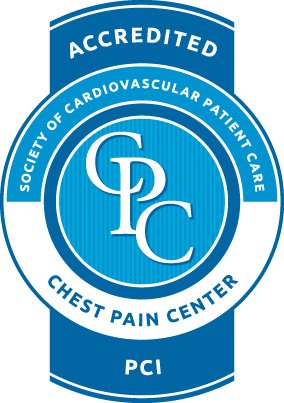Bronson Methodist Hospital's Chest Pain Emergency Center Receives Highest Level of Reaccreditation

Bronson Methodist Hospital’s Chest Pain Emergency Center (CPEC) recently received the highest level of reaccreditation from the Society of Chest Pain Centers (SCPC). Accreditation by the Society assures the public that Bronson’s Chest Pain Emergency Center meets or exceeds national quality-of-care measures in acute cardiac medicine.
Bronson Methodist Hospital became the first accredited chest pain emergency center in southwest Michigan in 2005 and has successfully undergone a rigorous site visit and reaccreditation process every three years since. It is now a Cycle IV Accredited Chest Pain Center with PCI (percutaneous coronary interventions) which acknowledges expertise in assessing the risk of a heart attack through less invasive means or cardiac catheterization to restore heart function.
The CPEC is a highly specialized unit designed for rapid evaluation of patients who come to the emergency department with chest discomfort. It helps the hospital to reduce time to treatment during the critical early stages of a heart attack, when treatments are most effective. It also helps hospital staff to better monitor patients when it is not clear whether they are having a heart attack. Such observation helps ensure the patient is neither sent home too early nor needlessly admitted.
“Having worked for many years as an emergency department physician, I have seen firsthand how well the Chest Pain Emergency Center serves our patients and their families. The onset of chest pain often causes fear and worry. In the CPEC, the medical team is able to quickly diagnose the source of the pain and begin appropriate treatment,” says Dr. Scott C. Gibson, Bronson Trauma and Emergency Center medical director. “This helps reduce patient stress and leads to better outcomes.”
As the region’s largest emergency department and only Level I trauma center, there is another benefit to having a dedicated chest pain unit. It frees up emergency department staff and exam rooms to expedite care for the thousands of patients who come to Bronson each year with non-chest pain emergencies.
The CPEC is staffed by a team of emergency medicine doctors, board-certified cardiologists, radiologists and nurses with specialized training in heart care. The CPEC team collaborates with each other and with regional emergency medical services.
People experiencing any of these symptoms should call 9-1-1 immediately:
- Recurrent discomfort that feels like indigestion
- More intense chest pain upon exertion, subsiding with rest
- Squeezing pain or pressure in the chest
- Shortness of breath
- Discomfort in the neck, jaw, arm and/or back
- Flu-like symptoms such as nausea, dizziness, weakness and sweating
Women may also experience:
- Stomach/abdominal pain
- Fatigue
- Unexplained anxiety
- Cold sweat
- Paleness
Heart disease and heart attacks are the leading cause of death in the United States, killing 600,000 people annually. Recognizing and reacting to the early stages of a possible heart attack can help minimize the loss of important heart muscle, and significantly reduce risks for complications and death.
Some of the diagnostic tests used to evaluate chest pain include blood tests to detect the slightest signs of heart attack, computerized serial electrocardiogram (EKG) for continuous information on heart activity, and cardiac nuclear stress testing that can help detect problems with blood flow to the heart. These tools are all part of the care provided at Bronson Methodist Hospital’s Chest Pain Emergency Center.